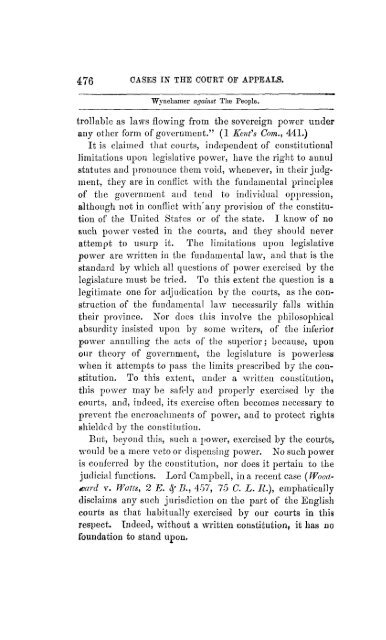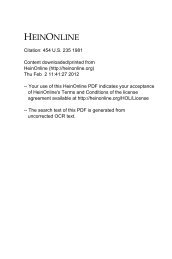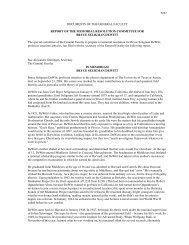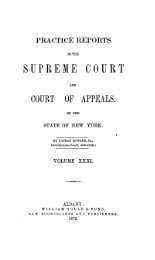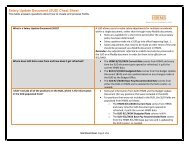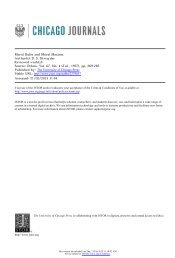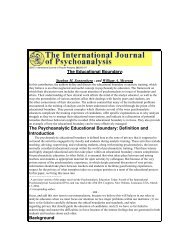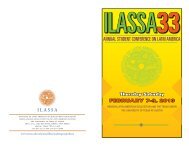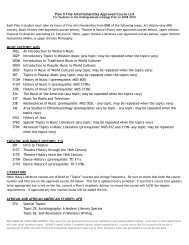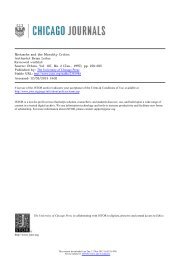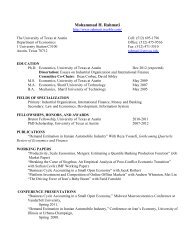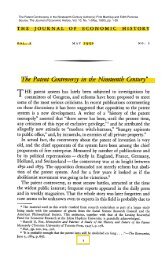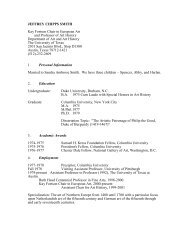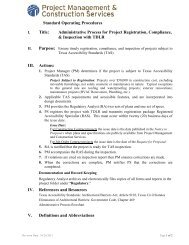Wynehamer v People.pdf - The University of Texas at Austin
Wynehamer v People.pdf - The University of Texas at Austin
Wynehamer v People.pdf - The University of Texas at Austin
You also want an ePaper? Increase the reach of your titles
YUMPU automatically turns print PDFs into web optimized ePapers that Google loves.
476 CASES IN THE COURT OF APPEALS.<strong>Wynehamer</strong> against <strong>The</strong> <strong>People</strong>.troll able as laws flowing from the sovereign power underany other form <strong>of</strong> government." (1 Kent's Com., 441.)It is claimed th<strong>at</strong> courts, independent <strong>of</strong> constitutionallimit<strong>at</strong>ions upon legisl<strong>at</strong>ive power, have the right to annulst<strong>at</strong>utes and pronounce them void, whenever, in their judgment,they are in conflict with the fundamental principles<strong>of</strong> the government and tend to individual oppression,although not in conflict with'any provision <strong>of</strong> the constitution<strong>of</strong> the United St<strong>at</strong>es or <strong>of</strong> the st<strong>at</strong>e. I know <strong>of</strong> nosuch power vested in the courts, and they should never<strong>at</strong>tempt to usurp it. <strong>The</strong> limit<strong>at</strong>ions upon legisl<strong>at</strong>ivepower are written in the fundamental law, and th<strong>at</strong> is thestandard by which all questions <strong>of</strong> power exercised by thelegisl<strong>at</strong>ure must be tried. To this extent the question is alegitim<strong>at</strong>e one for adjudic<strong>at</strong>ion by the courts, as 1he construction<strong>of</strong> the fundamental law necessarily falls withintheir province. Nor does this involve the philosophicalabsurdity insisted upon by some writers, <strong>of</strong> the inferiorpower annulling the acts <strong>of</strong> the superior; because, uponour theory <strong>of</strong> government, the legisl<strong>at</strong>ure is powerlesswhen it <strong>at</strong>tempts to pass the limits prescribed by the constitution.To this extent, under a written constitution,this power may be safely and properly exercised by thecourts, and, indeed, its exercise <strong>of</strong>ten becomes necessary toprevent the encroachments <strong>of</strong> power, and to protect rightsshielded by the constitution.But, beyond this, such a power, exercised by the courts,would be a mere veto or dispensing power. No such poweris conferred by the constitution, nor does it pertain to thejudicial functions. Lord Campbell, in a recent case (Woodwardv. W<strong>at</strong>ts, 2 E. Sf B., 457, 75 C. L. II.), emph<strong>at</strong>icallydisclaims any such jurisdiction on the part <strong>of</strong> the Englishcourts as th<strong>at</strong> habitually exercised by our courts in thisrespect. Indeed, without a written constitution, it has n<strong>of</strong>ound<strong>at</strong>ion to stand upon.


